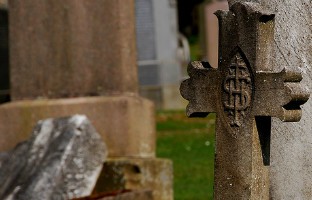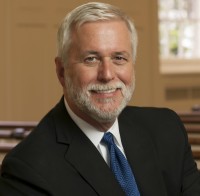Gravesite blessing
Shoots of grass are emerging here and there around the fresh burial mound. Indignant, my companion bends down to pluck away a dandelion that's growing next to the tombstone. Then she takes the cut flowers that are clutched in her hand and lays them at the base of the tombstone. She stands back up, surveys the grave with a sigh and takes my hand.
I buried her husband here six weeks ago. The tombstone had just arrived, and she wanted me to see it. Actually, she asked me to bless it. I told her, "I have no idea what it even means to bless a grave marker. But sure. Let's go and I'll think of something."
Read our latest issue or browse back issues.
Her husband died after a long battle with leukemia. Three years earlier, on my first Sunday as the pastor of their church, he shook my hand and said he was pleased to meet the man who would do his funeral. He wasn't that old, but his face was a shade of gray I'd never seen before. So I bumped his name up on my new visitation list.
When I arrived at their house he met me at the door and slowly led me to his back porch while leaning on a cane. I can still see his wife, an elegant woman in a string of pearls waiting for us with a tray of lemonade glasses in her hands and anxiety on her face.
They asked about me; I asked about them. They had spent most of their marriage away from home in Washington, D.C., where he held several high-ranking political posts. He believed his work was important but thought Washington a strange town. With a gleam in his eye, he told me that he'd often come through the door at night, look at his wife and say, "We're not in Kansas anymore." Now they were out of Washington politics and glad to be back where life seemed normal again. But normal is slippery.
Not long after they returned, he was diagnosed with his disease. When I visited him in the hospital over those three long years, he would sometimes repeat the Kansas phrase; it seemed to mean a lot to him. Finally I asked him about it. "Dorothy and Toto were on to something," he said. "My most extraordinary experiences have been the frightening ones." He recalled how often he was frightened even as a husband and father. "But," he said softly, "the scary times are the ones when you learn the most about yourself."
He was the kind of parishioner every pastor needs. He had no illusions that he would live forever; he talked freely about his death, asking me to help him make holy sense of a terminal disease and the life that he now had to time to ponder. Every conversation went deep. Some of them were about heaven. He believed but needed help with his unbelief. Mostly he was worried about his family. I always left these pastoral encounters sad, glad and grateful that I was invited to listen in as his soul grappled with the fear of "leaving normal."
Over the course of his last six months he felt himself dying several times. He had read books about dying and wanted to do it well. More than once he assembled his family and friends to say goodbye but then pulled through. This began to embarrass him, so we had another long talk about death as the loss of control. He smiled, shrugged and said, "Of course. Why should my death be different than my life?"
When I left seminary I assumed that I would spend most of my time attending to the confusions and yearnings of my parishioners' souls. But I soon discovered that many of those souls are buried beneath layers of distraction. Not this guy's soul. He didn't care about the church's budget, its new strategic plan or the sexual orientation of the choir director. He just wanted help finding a faith to carry him through a life that'd been full of interruptions. I think that's why we pastors often fall in love with the dying.
I have no illusions about death; I've seen it up close and often. It hurts, is messy and smells bad. But there is something about this undistracted, created vulnerability that makes even God fall in love with those who are dying.
At the funeral there were lots of pauses in my homily. Those in the pews forget that pastors sometimes have to fight back their own grief in order to lead the service. But that's my calling. Eventually, I found the words that proclaim our belief in the resurrection to eternal life.
Six weeks later I'm at the gravesite saying a prayer with his wife. When I am done, she wipes away a tear and says, "I have a surprise for you." Then she leads me to the back of the tombstone. At the bottom are etched the words: Not in Kansas anymore.







